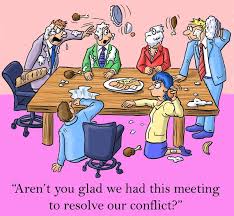
Utilizing Dialogue In Conflict Resolution
The dictionary of contemporary English defines dialogue as a conversation, which examines differences of opinion between leaders.
However, the English Language, records two types of dialogue, constructive dialogue and the dialogue of the deaf.
Constructive dialogue, involves the airing of views, discussions and debates with a view to reaching a consensus.
Dialogue of the deaf on the other hand, refers to a discussion or a negotiation in which each side ignores the argument advanced by the other party.
Indeed, nothing can be more cherished in the society today towards conflict resolution than the use of constructive dialogue.
This is because, the use of violence or the disruption of a system, most times has tended to tear apart the fractious components welded together by the common goal of nation building.
Of note, is the fact that violence itself, is a product of a failed or non application of dialogue with the attendant consequences of disunity, dis-order and chaos in the society.
In order words, any society in which dialogue fails, and violence becomes the order of the day, there is bound to be little or no progress.
That is why over the years, the society has witnessed sporadic violence largely because of reluctance on the part of citizens to imbibe the culture of constructive dialogue in the settlement of disputes.
Regrettably, while most people want to claim their rights, they have refused to recognise the rights of others, or to understand the circumstances in which certain decisions are made when they are not favourable to them.
It is in this perspective that analysts have underscored the need for individuals, communities and groups to rub minds on burning socio- economic and political issues with a view to reaching a middle ground that is conducive for all.
This has become pertinent, given the current democratic dispensation, and the various fora open to people to canvass their interest on matters, no matter how extreme such interests may be.
This implies that, at all times, the use of violence or any other act likely to be counter productive, and not to the interest of the masses, should be discouraged in the settlement of disputes.
It is a fact that violence or disruption never wins or achieves victory, and even if it does, such victory is always known to be won at too great a cost. With the current economic challenges that has led to high inflation, Nigerians must agree that the situation the nation finds herself today is as a result of past deeds and collective failure, to take appropriate actions, when necessary.
Therefore, there cannot be overnight solution to problems affecting the nation that has accumulated over the years by ensuring that the right leaders are chosen irrespective of tribe and religion.
There is the need for all citizens to imbibe a culture of tolerance, mutual respect, goodwill, equity and fair play.
This is crucial if democracy is to survive.
Tribal leaders and political leaders, who prefer to play the drums of war, to serve their interests should realize that in this age, a man’s heroism is not measured by the number of human heads he brings from war or how many communities he has decimated.
Rather, a man’s achievement today, is reckoned by the progress and development he or she has attracted to his or her community and society, at large.
With the current economic reality that is biting hard on Nigerians, it is indeed a task before the nation’s leaders and the other citizens to build a culture of dialogue which should allow all viewpoints to be heard, and desist from policies that will disunite the country.
By Fabian Ahwen, Edited By Grace Namiji



Commentary
Utilizing Dialogue In Conflict Resolution
todayFebruary 24, 2024 5
Utilizing Dialogue In Conflict Resolution
The dictionary of contemporary English defines dialogue as a conversation, which examines differences of opinion between leaders.
However, the English Language, records two types of dialogue, constructive dialogue and the dialogue of the deaf.
Constructive dialogue, involves the airing of views, discussions and debates with a view to reaching a consensus.
Dialogue of the deaf on the other hand, refers to a discussion or a negotiation in which each side ignores the argument advanced by the other party.
Indeed, nothing can be more cherished in the society today towards conflict resolution than the use of constructive dialogue.
This is because, the use of violence or the disruption of a system, most times has tended to tear apart the fractious components welded together by the common goal of nation building.
Of note, is the fact that violence itself, is a product of a failed or non application of dialogue with the attendant consequences of disunity, dis-order and chaos in the society.
In order words, any society in which dialogue fails, and violence becomes the order of the day, there is bound to be little or no progress.
That is why over the years, the society has witnessed sporadic violence largely because of reluctance on the part of citizens to imbibe the culture of constructive dialogue in the settlement of disputes.
Regrettably, while most people want to claim their rights, they have refused to recognise the rights of others, or to understand the circumstances in which certain decisions are made when they are not favourable to them.
It is in this perspective that analysts have underscored the need for individuals, communities and groups to rub minds on burning socio- economic and political issues with a view to reaching a middle ground that is conducive for all.
This has become pertinent, given the current democratic dispensation, and the various fora open to people to canvass their interest on matters, no matter how extreme such interests may be.
This implies that, at all times, the use of violence or any other act likely to be counter productive, and not to the interest of the masses, should be discouraged in the settlement of disputes.
It is a fact that violence or disruption never wins or achieves victory, and even if it does, such victory is always known to be won at too great a cost. With the current economic challenges that has led to high inflation, Nigerians must agree that the situation the nation finds herself today is as a result of past deeds and collective failure, to take appropriate actions, when necessary.
Therefore, there cannot be overnight solution to problems affecting the nation that has accumulated over the years by ensuring that the right leaders are chosen irrespective of tribe and religion.
There is the need for all citizens to imbibe a culture of tolerance, mutual respect, goodwill, equity and fair play.
This is crucial if democracy is to survive.
Tribal leaders and political leaders, who prefer to play the drums of war, to serve their interests should realize that in this age, a man’s heroism is not measured by the number of human heads he brings from war or how many communities he has decimated.
Rather, a man’s achievement today, is reckoned by the progress and development he or she has attracted to his or her community and society, at large.
With the current economic reality that is biting hard on Nigerians, it is indeed a task before the nation’s leaders and the other citizens to build a culture of dialogue which should allow all viewpoints to be heard, and desist from policies that will disunite the country.
By Fabian Ahwen, Edited By Grace Namiji
Written by: Salihu Tejumola
Utilizing Dialogue In Conflict Resolution
Similar posts
Commentary
Granting Autonomy To Local Governments
todayMay 18, 2024 13 2
Commentary
Integrating Robotics Into Primary School Curriculum
todayMay 15, 2024 17
Post comments (0)
Recent Posts
Recent Comments
Weekend Shuttle
3:00 pm - 8:00 pm
Top popular
CG VGN Congratulates New Service Chiefs, IG, NSA
Stainless Steel Juicer – Making Juicing Fun And Easy
Stainless Steel Juicer – Making Juicing Fun And Easy
Uzoka-Anite Assumes Duty As Minister Of Industry, Trade and Investment
Me – Too Was Needed, But Has It Gone Too – Far?: 4 Considerations!
Chart
1
Sunshine
Tommy Blues
Sunshine Tommy Blues
2
Red
Frank Lee
Red Frank Lee
3
Eclipse
Donna May
Eclipse Donna May
Full tracklist